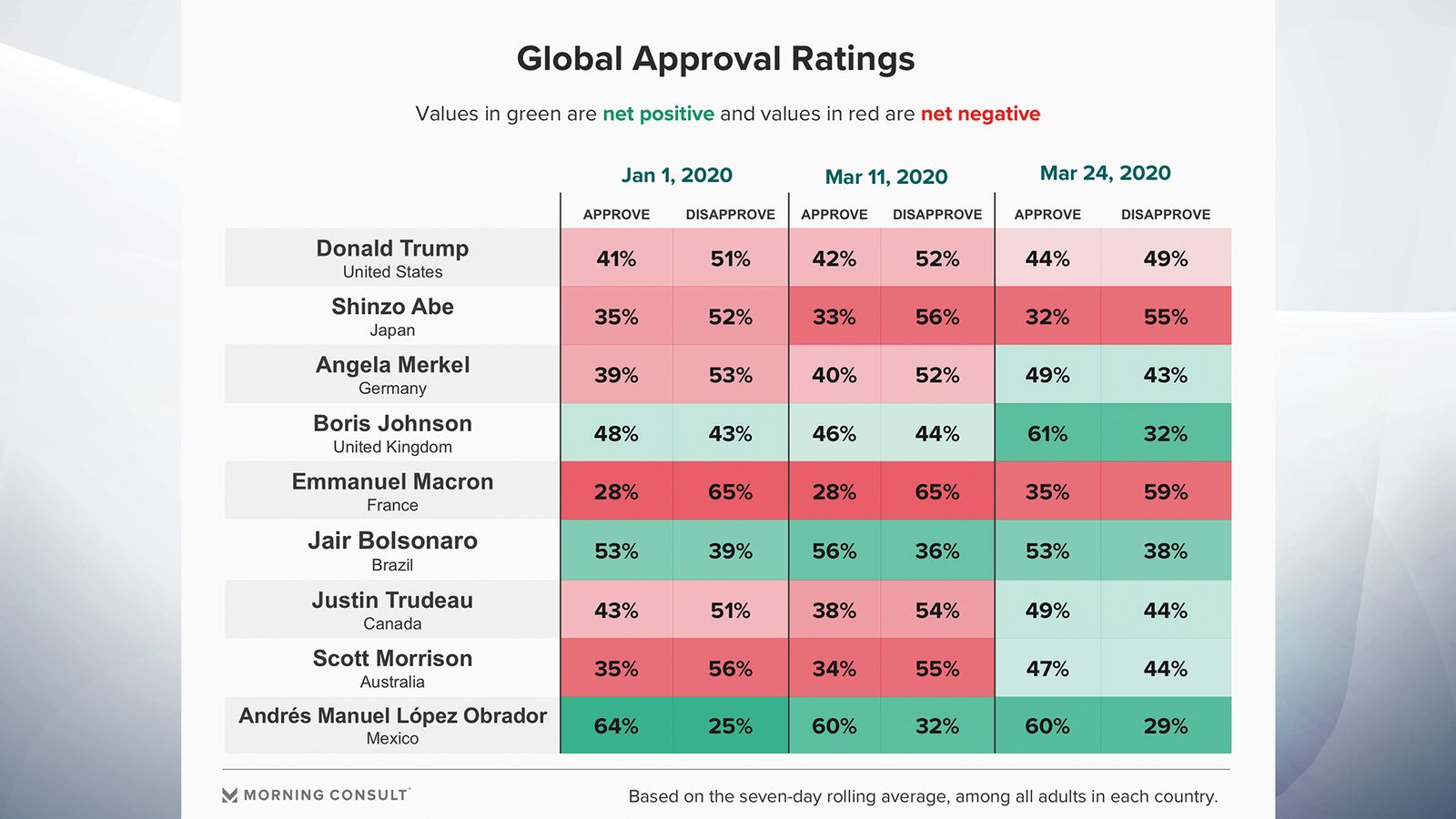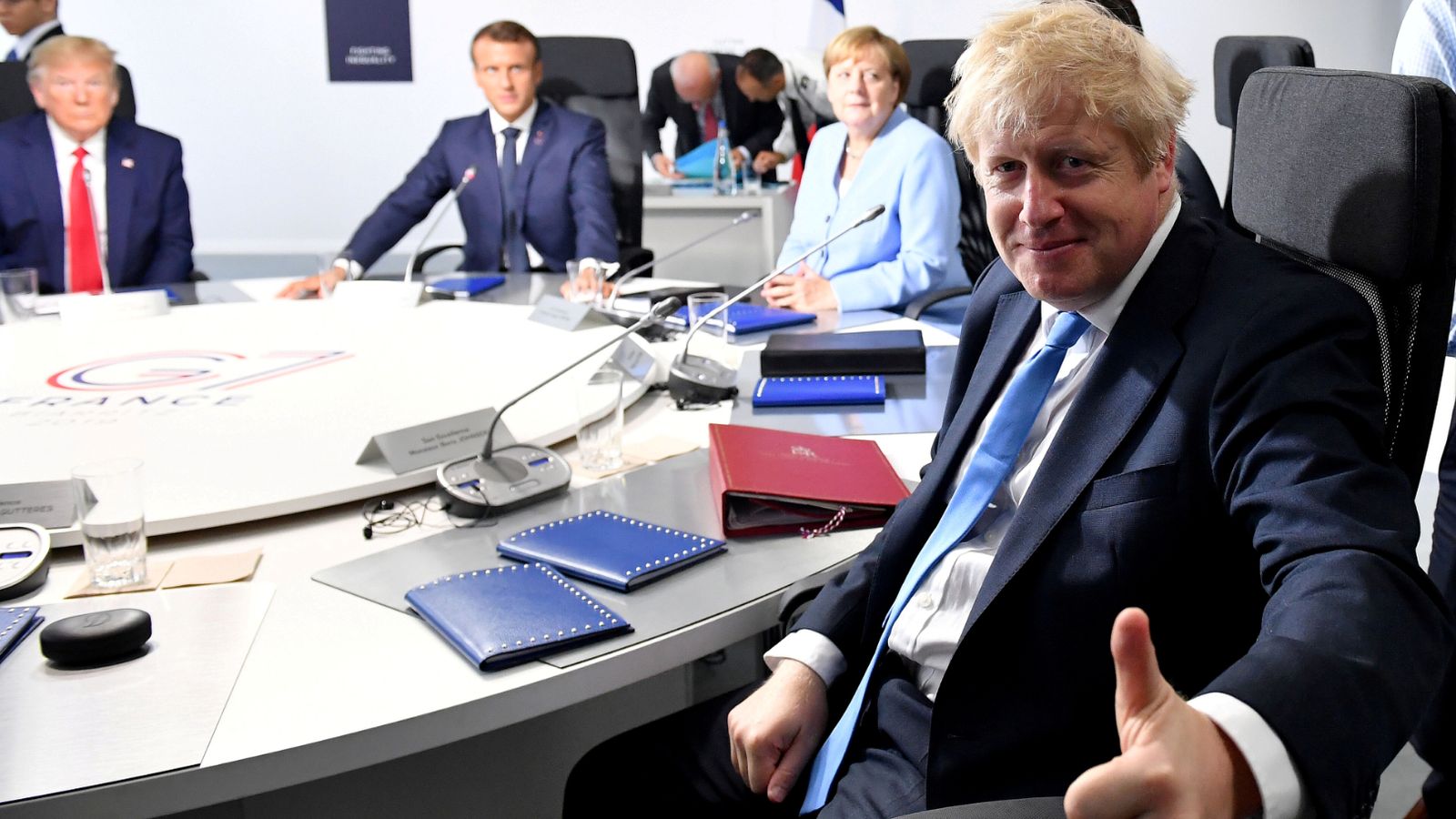- Joined
- Dec 11, 2018
- Messages
- 1,237
- Trophies
- 0
Boris Johnson's popularity - like that of the majority of world leaders - has risen significantly during the coronavirus crisis.
As tracked by Ipsos MORI, the prime minister's satisfaction ratings had improved to 52% by mid-March.
This is an increase of five points from 47% at the start of February, and up 16 points on his ratings back in early December (36%), just before the general election.
Polling by Number Cruncher more recently found that Johnson's satisfaction ratings had risen to 72%.
But Mr Johnson is by no means alone.
At a time of unprecedented global crisis, and with only one or two exceptions, leaders the world over are experiencing rising popularity.
Measured by Gallup, US President Donald Trump's job ratings have soared to their highest ever point, with 49% of adults approving of his performance and 45% disapproving.
French President Emanuel Macron has seen an even larger increase in his satisfaction rating than his counterparts - rising to 51%, some 13 points up since last month, and his highest since January 2018.
German Chancellor Angela Merkel has seen her approval rise to a meteoric 79%, up 11 points since early March - a remarkable figure for a leader who has been in power for well over a decade.
The approval rating of Giuseppe Conte, prime minister of Italy, the country worst-hit so far in terms of deaths, has hit 71% - an incredible 27 points higher than in February.
More broadly, polling firm Morning Consult reports that approval has risen in their daily tracker survey for a number of world leaders since the World Health Organisation (WHO) declared a pandemic.
Indeed, virtually the only leader to have seen their ratings markedly decline is Brazil's populist far-right president, Jair Bolsonaro, with the public seemingly unimpressed by his coronavirus-denialism.
What is interesting, however, is that this widespread rise in popularity appears to have little to do with actual performance in handling the crisis so far - with both the US and UK response having been criticised at times.
So what explains the fact that world leaders' popularity seems to be rising regardless?
Most obviously what we seem to be seeing is the "rally-round-the-flag" effect originally proposed by American political scientist John Mueller.
The characteristics that Mr Mueller linked with these surges of popular support for incumbents were inspired by Cold War events, but have substantial resonance with the COVID-19 outbreak.
For a rally-round-the-flag to occur, the event had to be international, involve the country and its leader directly, and be "specific, dramatic, and sharply focused".
The global significance of the coronavirus pandemic - and the fact that the fight against it can (and has been) likened to a war - fits perfectly with this definition.
In all countries, leaders have been a central figure in the government response.
As to what drives this rally-round-the-flag at times of national crisis, one of the traditional explanations was that patriotic feelings led the public to view their incumbent leader as the focus of national unity, leading to greater support as citizens set aside their partisan biases.
Others have argued that rallies in popularity depend on opposition politicians temporarily laying aside their partisan interests and on increased levels of media coverage, thereby influencing how the public perceive leaders.
Another view is that when feeling vulnerable and under threat, citizens put their trust in political leaders and authorities to protect them.
Whichever explanation works best, however, a big question remains: how long is any rise in popularity for our current crop of leaders likely to last?
To address it we can, perhaps, look to one fairly recent precedent
The last rally-round-the-flag with similar global ramifications as COVID-19 was that following the 9/11 attacks on America.
In the aftermath, President George W Bush's approval rating jumped nearly 40 points to 90%, the highest ever recorded for a US president.
More than a year later President Bush's approval rating was 68%, still nearly 20-points higher than his rating at the time of the attacks.
Nothing, however, lasts forever.
President Bush's popularity declined steadily throughout his first and second terms, and in the end only Harry S Truman and Richard Nixon left the White House with lower ratings.
It is impossible to say, then, precisely when the COVID-19 rally-round-the-flag effect might start to fade and then finally end.
As people are finally able to move beyond the pandemic, political gravity is bound to kick in: what goes up must come down.
Where that leaves individual leaders will depend in large part not just on how they are eventually seen to have handled the current crisis, but also on how they handle other issues whose importance to voters will gradually grow again.


Coronavirus: Why Boris Johnson and other world leaders have become more popular during outbreak
A "rally-round-the-flag" effect seems to be taking place around the world as countries deal with the COVID-19 pandemic.